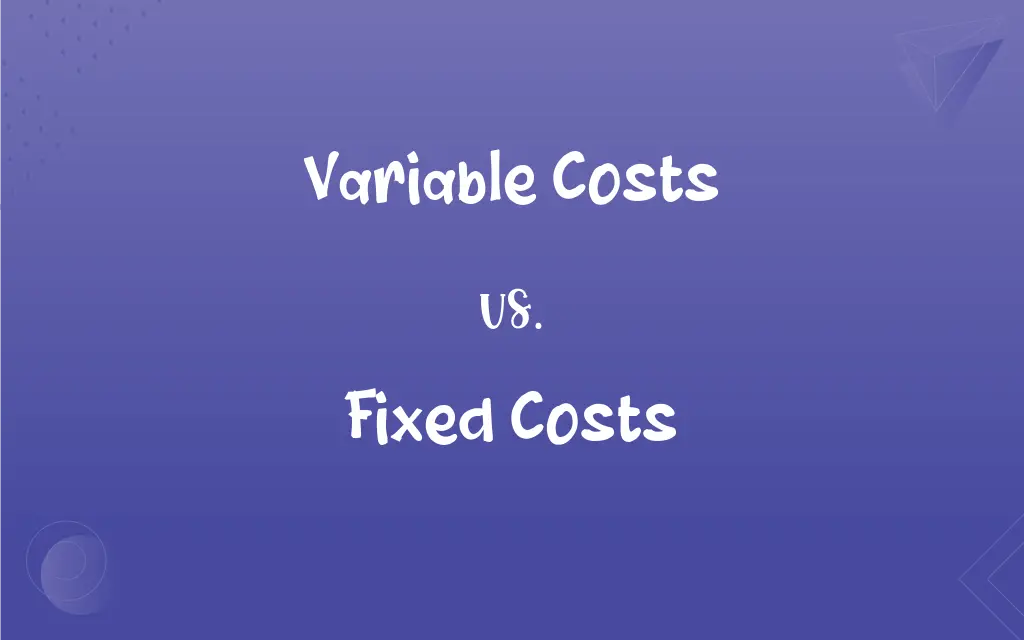Variable Costs vs. Fixed Costs: What's the Difference?
Edited by Janet White || By Harlon Moss || Updated on October 17, 2023
Variable costs change with production volume; fixed costs remain unchanged, regardless of output.

Key Differences
Variable costs are expenses that change in proportion to the activity of a business, and they are also the sum cost of labor and materials that vary with production volume. In contrast, fixed costs are expenses that do not change with the amount of goods or services produced, essentially remaining constant regardless of production levels.
When considering variable costs, these are costs that fluctuate directly with every unit of production or service provided, meaning they increase as production expands and decrease as production contracts. On the other side, fixed costs are the opposite; they're set expenses that the business incurs no matter the number of goods produced.
Variable costs can include things like raw materials and supplies, which go up as production increases, showing a direct relationship between the cost and the quantity produced. However, fixed costs, such as rent and salaries, do not vary with the success of the products or services sold, remaining static over time.
In accounting, variable costs are often seen as preferable because they can be more easily managed and reduced, aiding a company's profitability. Conversely, fixed costs can sometimes present challenges due to their unchanging nature, requiring payment even during slow business periods.
During financial analysis, variable costs are crucial for understanding the total cost of production and setting appropriate product prices. Fixed costs, however, are pivotal in determining the company's break-even point and necessary sales volumes for profitability.
ADVERTISEMENT
Comparison Chart
Nature
Costs that vary with production.
Costs that are static in nature.
Examples
Direct materials, commission fees.
Rent, insurance, salaries.
Management
Easier to manage and cut during downturns.
Difficult to reduce in short term.
Profitability
Direct impact on per-unit profit.
Indirect impact, affecting overall margins.
Risk
Lower with less production, higher with more.
Constant risk, regardless of output.
ADVERTISEMENT
Variable Costs and Fixed Costs Definitions
Variable Costs
Variable costs are expenses that can be adjusted on a per-unit basis.
Their strategy was to reduce variable costs by seeking cheaper suppliers.
Fixed Costs
Fixed costs contribute to the overall financial obligations of a company, independent of performance.
The CFO analyzed fixed costs to evaluate the company's break-even point.
Variable Costs
Variable costs form part of the total cost of production, increasing or decreasing with the level of output.
Variable costs were carefully monitored to maintain a competitive pricing strategy.
Fixed Costs
Fixed costs are expenses that do not change over a specified period, regardless of production levels.
The company's fixed costs included the monthly rent for their headquarters.
Variable Costs
Variable costs are directly proportional to the volume of goods or services produced.
As they ramped up their product output, their variable costs for labor also rose.
Fixed Costs
Fixed costs are recurring, predetermined expenses necessary for a business’s operation.
Annual licensing fees were a part of their fixed costs.
Variable Costs
Variable costs fluctuate based on operational activity.
They noticed a drop in variable costs during off-peak seasons when their production rates slowed.
Fixed Costs
Fixed costs are expenses that need to be paid, even if the business isn’t producing any goods or services.
During the shutdown, the company still faced fixed costs like property taxes.
Variable Costs
Variable costs are costs that change in relation to production output.
The company's variable costs increased due to the higher raw material prices with increased production.
Fixed Costs
Fixed costs remain constant and are not affected by fluctuations in business activity.
Regardless of sales revenue, their fixed costs such as insurance remained the same.
FAQs
What are variable costs in a business context?
Variable costs are expenses that change in direct proportion to a business's production volume.
Can variable costs become fixed costs?
No, variable costs fluctuate with production levels, while fixed costs remain constant.
How can a company reduce its variable costs?
Companies can negotiate lower supplier prices or improve operational efficiencies.
What's a real-life example of variable costs?
A restaurant's cost for ingredients varies based on the number of meals prepared.
How do variable costs affect pricing strategies?
They influence per-unit cost, affecting pricing and competitive positioning.
Are salaries considered fixed costs?
Yes, salaries are typically fixed costs as they are consistent regardless of production levels.
What is a common example of fixed costs?
Monthly office rent is a common fixed cost for businesses.
What role do variable costs play in financial forecasting?
They help in predicting costs for various production scenarios, aiding in budgeting.
How do variable costs relate to economies of scale?
As production increases, variable costs per unit can decrease, benefiting from economies of scale.
How do fixed costs impact a company’s budget?
Fixed costs require regular payments and affect the overall budget, regardless of business performance.
Do fixed costs affect profitability?
Yes, high fixed costs require higher revenue for profitability.
Are sales commissions considered variable costs?
Yes, because they increase with higher sales volumes.
Is rent a variable or fixed cost?
Rent is a fixed cost because it doesn't fluctuate with production volume.
Are fixed costs relevant for break-even analysis?
Absolutely, they determine the revenue needed to cover all costs, identifying the break-even point.
Why are variable costs important in production?
Variable costs determine production scalability and profitability per unit.
Are fixed costs always fixed?
Generally, yes, but they can change over a longer period or due to significant operational changes.
Do fixed costs need to be covered even in low production periods?
Yes, fixed costs must be paid regardless of output levels.
Can fixed costs change over time?
They can, but changes are usually planned and not related to production levels.
Why is understanding fixed costs important for new businesses?
It helps in assessing ongoing financial obligations and calculating break-even points.
Can variable costs impact a business's cash flow?
Yes, increased production can lead to higher variable costs, affecting cash flow.
About Author
Written by
Harlon MossHarlon is a seasoned quality moderator and accomplished content writer for Difference Wiki. An alumnus of the prestigious University of California, he earned his degree in Computer Science. Leveraging his academic background, Harlon brings a meticulous and informed perspective to his work, ensuring content accuracy and excellence.
Edited by
Janet WhiteJanet White has been an esteemed writer and blogger for Difference Wiki. Holding a Master's degree in Science and Medical Journalism from the prestigious Boston University, she has consistently demonstrated her expertise and passion for her field. When she's not immersed in her work, Janet relishes her time exercising, delving into a good book, and cherishing moments with friends and family.































































